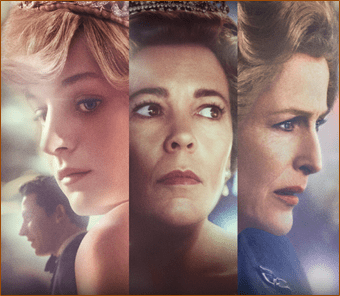
Secrets, marriage problems, and constant attention from the paparazzi. While this may sound like a celebrity exposé from E! News, it actually describes the depiction of the royal family and UK government officials in the latest season of Netflix’s The Crown. First released in 2016, the series covers the more recent history of British politics, with the fourth season’s plot focused on the relationship between Prince Charles and Princess Diana and the Margaret Thatcher administration. While Princess Diana’s reputation as a culturally beloved icon is maintained, the show characterizes the royal family (and specifically Prince Charles) as cold and distant, with Thatcher as an apathetic leader without concern for the public’s best interest. As expected, the royal family was not pleased with their portrayal this season and, in response, pressured the creators to add a disclaimer claiming the series as historical fiction. However, Netflix refused the appeal and left the series as is, ensuing debate from defenders of the royals and the show alike.
On one hand, fans of The Crown argue that Netflix has no obligation to include a disclaimer because the series is already categorized as a historical drama. One opinion piece author, Ani Bundel, said: “If [the British monarchy] is really so fragile that 10 episodes of a costume drama can topple it, the royals clearly have bigger problems” (Bundel, 2020). The same author also brings up the problematic nature of national politics dictating art and media. If Netflix were to appease the royals, it could possibly open the door for more internal politics to sway Netflix’s programming decisions. Additionally, would we be taking a step toward authoritarianism if political hands were able to force their will through art? In a society that values freedom of choice and expression, the very idea of the subjugation of art is alarming. It’s no secret that art goes under fire during authoritarian regimes, and even if the UK government is miles away from becoming authoritarian, isn’t just the adoption of repressive practices enough to justify backlash in the name of democracy?
Moreover, some question whether the royals’ real concern is about the show distorting true events or about its painful accuracy. Indeed, while it’s not inherently odd for the royal family to press for a disclaimer, it is confusing that they asked for it only recently despite previous seasons also straying from historical accuracy. Bundel further suggested that perhaps The Crown only received backlash now because this time the series’ depiction of events was closer to the truth. After all, Prince Charles is already known for his volatile public image. Could the royal family be so adamant about a disclaimer because they have spent decades trying to repair it?
On the other hand, some have rallied with the royals saying the portrayal may as well have been a “caricature” (Thompson, 2020). A senior lecturer in British History at Newcastle University, Dr. Martin Farr, said the show played upon impressions of the royals that the public already had rather than prioritizing factual events. Most notably, Farr mentions the relationship between the queen and Margaret Thatcher. According to Farr, the public assumed the two women’s relationship was strife with tension, and the show exaggerated the dynamic to align with the public’s assumptions. However, Farr shares the only substantial policy disagreement between the two women was whether or not the UK government should have imposed economic sanctions on South Africa in response to apartheid. Farr added that overall, the portrayal was “quite mendacious” (Thompson, 2020).
Furthermore, an argument could be made that counter narratives which sacrifice accuracy for creative license have the potential to jeopardize national interests if it is accepted as fact by enough people. For example, Americans experienced something similar during the 2020 presidential election as accusations of widespread voter fraud threatened not only the outcome of the election but also the safety of anyone near the Capitol as electoral votes were confirmed. Thus, it’s essential to recognize the implications certain portrayals of political entities can have and that media is not free of consequence.
Despite the very real dangers Americans have recently witnessed, it is questionable whether the dramatization of decades-old historical events to current national politics is a fair comparison to make. Perhaps The Crown should have the creative license to depict history as it pleases, especially since it’s categorized as a drama. Or, perhaps exercising complete free creative reign can be reckless and possibly detrimental. Ultimately, the question of free will and public well-being falls at our feet, time and time again. Should we expend expression and free will in the hopes that it benefits public safety, or is it better to allow free will to run its course, regardless of the consequences?
Discussion Questions:
- What ethical values are in conflict in this case?
- Are art and entertainment obligated to uphold accuracy? If so, how does this determine entertainment’s approach to counter narratives?
- Does it matter whether the famous figures being portrayed have already passed away? Why or why not?
- What does art owe society? Must art always help the causes of promoting historical truths and pro-social behaviors, for instance?
Further Information:
Bundel, Ani. (2020, December 8). “Netflix’s ‘The Crown’ Disclaimer Debate Says More About the Queen Than it Does the Series.” NBC News. Available at: https://www.nbcnews.com/think/opinion/netflix-s-crown-disclaimer-debate-says-more-about-queen-it-ncna1250309
Landler, Mark. (2020, November 26). “The Crown’s Stokes an Uproar Over Fact vs Entertainment.” New York Times. Available at: https://www.nytimes.com/2020/11/26/world/europe/Crown-Royals-Fact-Fiction.amp.html
The Crown. Created by Peter Morgan, season 4, Netflix Streaming Services, 2020.
Thompson, Rachel. (2020, November 25). “Just How Accurate is the Portrayal of Thatcher and the Queen’s Relationship on ‘The Crown’?” Mashable. Available at: https://mashable.com/article/the-crown-thatcher-queen-relationship/
Thompson, Rachel. (2020, November 25). “Just How Accurate is the Portrayal of Thatcher and the Queen’s Relationship on ‘The Crown’?” Mashable. Available at: https://mashable.com/article/the-crown-thatcher-queen-relationship/
Authors:
Amanda Russell, Kat Williams, & Scott R. Stroud, Ph.D.
Media Ethics Initiative
Center for Media Engagement
University of Texas
August 10, 2022
Image: Screenshot from Netflix
This case study can be used in unmodified PDF form for classroom or educational settings. For use in publications such as textbooks, readers, and other works, please contact the Center for Media Engagement.
Ethics Case Study © 2022 by Center for Media Engagement is licensed under CC BY-NC-SA 4.0




